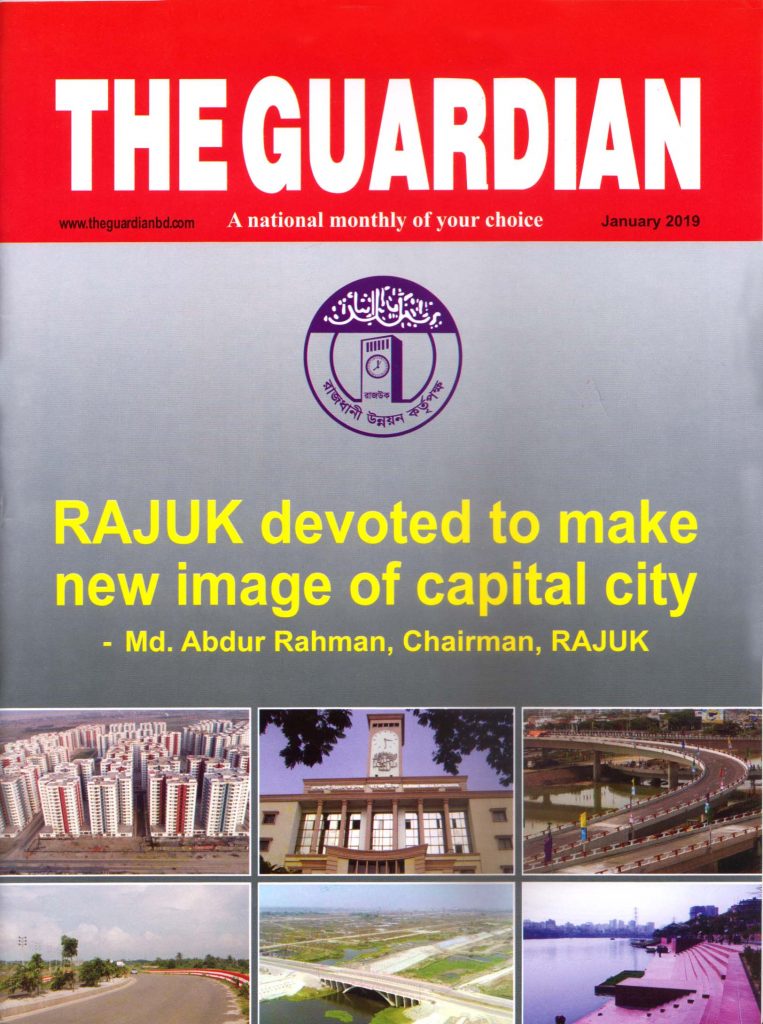The Foreign Aided Projects Audit Directorate (FAPAD) is a specialized arm among the ten directorates of the Office of the Comptroller & Auditor General (OCAG), the Supreme Audit Institution (SAI) of Bangladesh and entrusted to auditing the activities of all development and technical assistance projects and programs in the public sector funded by foreign aid, said Zeenat Khan, Director General, FAPAD, in an exclusive interview with The Guardian.
The Director General further said that as a result of its only one of kind task of development project auditing, FAPAD provides independent assurance and report on the proper accounting of project resources to the National Parliament of Bangladesh as well as to the Development Partners also.
She informed that FAPAD carries out financial audit of projects and programs funded by the development partners as their regular audit practice. She also added that audit service provided by FAPAD is integrated and designed to meet the explicit and implied requirements of the Development Partners. So, fiduciary requirements of the Development Partners and the Government of Bangladesh set the audit direction.
The Director General mentioned that it is a great challenge for the government to utilize the foreign fund effectively, so through conducting audit, FAFAD ensures transparency and accountability of the foreign funds.
In this context, she mentioned that FAPAD recovers huge amount of money every financial year from foreign aided projects which spend money violating rules and regulations and deposit any unspent money in the government exchequer. She informed that the directorate has initiated ISSAI standard audit as well as performance audit to ensure that not only money is spent in conformity with rules and regulations but also whether the projects achieve its objectives.
She mentioned that their mission is to conduct effective audit of public sector operations for optimum utilization of public resources providing reliable and objective information to assist in establishing accountability and transparency in government activities. Keeping this spirit in view, she the new generation officers to take the challenges by sharing their new ideas, knowledge so that they can ensure transparency and accountability of public money.
In an exclusive interview, Director General Zeenat Khan, who is also a high-profile audit expert, replied to several questions covering the history, activities, different issues of institutional developments and changes, problems and potentials and contributions and achievements of FAPAD, including the steps already taken and what further steps to be taken by the government as well as by the Office of the Comptroller & Auditor General to improve the overall condition of FAPAD and the Audit Sector.
Her deliberations are quite outstanding, informative, educative and interesting as well. The excerpts of her valuable interview are presented here for The Guardian readers at home and abroad:
The Guardian: Please give us a brief founding history of FAPAD.
Director General: The Foreign Aided Projects Audit Directorate (FAPAD) is one of the dedicated audit directorates among the ten different audit directorates of the Office of the Comptroller & Auditor General (OCAG), the Supreme Audit Institution (SAI) of Bangladesh. This specialized arm of OCAG Bangladesh is entrusted to auditing the activities of all development and technical assistance projects and programs in the public sector funded by foreign aid. As a result of its only one of kind task of development project auditing, FAPAD provides independent assurance to Parliament as well as to Development Partners on the proper accounting for and use of project resources.
The present status and functions of FAPAD have been originated from a continuous pathway of auditing foreign aided projects since early eighties. The decades of 1970s to 80s, foreign aid sought to stabilize the economy of the country to bear the after effects of the war of independence. The increasing flow of foreign aid and the inevitability of ensuring proper accounting for and use of this aid instigated the thought of establishing an office for this purpose to the government. Moreover, satisfying the requirement laid down in the credit agreements of the government, top level supervision of foreign aided projects was required to be strengthened.
Since1981 there was no separate office for conducting audit of foreign aided projects. Beside this, major development partners like the World Bank and ADB concentrated on auditing of the development projects funded by them as well as other organizations. As a specific move World Bank in their letter to the Ministry of Finance and the Ministry of Planning, dated 09-06-1981 outlined the necessity of establishment of an office for auditing of foreign aided projects.
The then Comptroller & Auditor General Osman Ghani Khan on 15-12-1981 sent a proposal of opening a new office for accounting of foreign aid and for auditing of the foreign aided projects to the Finance Division, Ministry of Finance and the Ministry of Planning according to the mandate of CAG. Finance Division in consultation with ERD and World Bank conferred their final sanction of setting in 21-11-1982.
Finally, the activities of FAPAD commenced in March, 1983 with a setup of ninety nine posts including ten (10) audit teams as per the recommendations of the Enam Committee of Chief Martial Law Administrator. During its inception the office was known as Directorate of Audit, Foreign Aided Projects and first organizational setup was led by Director as head of the directorate followed by Additional Director as the second person. The other positions were Deputy Director, Audit and Accounts Officer, Superintendent, Auditor, Junior Auditor, and so on.
The Guardian: What are the major responsibilities discharged by FAPAD?
Director General: The major responsibilities as well as functions discharged by FAPAD are as follows:
1. Certification of project financial statements, expenditure statement;
2. Evaluation of control mechanism and control environment in the project;
3. Evaluation Project Implementation in terms of economy and efficiency;
4. Evaluation of compliance with applicable rules and regulations.
The Guardian: Is there any engagement of development partners with FAPAD activities as stakeholders?
Director General: Yes, obviously. The major partners of FAPAD’s audit engagement are diverse of International Organizations like, the UN agencies (UNDP, UNFPA, and UNICEF), FAO, JICA, the World Bank, IDA, WFP; Multilateral Financial Institutions such as ADB, IDB, EU, IFAD, AFD; Bilateral ODAs like KOIKA, LOC, Russia, GIZ, JICS, CHINA, DFID, USAID, etc.
Apart from other audit directorates of the OCAG, FAPAD carries out financial audit of projects and programs funded by these development partners as their regular audit practice. Audit service provided by FAPAD is integrated and designed to meet the explicit and implied requirements of the Development Partners. Fiduciary requirements of the Development Partners and Government of Bangladesh set the audit direction.
The Guardian: What is the present organizational structure of FAPAD?
Director General: FAPAD conducts audit by 6 major sectors (Sector 1 to 6) and prepares Audit Report for OCAG by one sector named Report sector. Besides this, the administration sections (1 and 2) and Coordination section maintains day to day administrative activities of the directorate.
The Guardian: And say whether this directorate has any branch or unit across the country?
Director General: The directorate doesn’t have any branch or unit across the country. FAPAD conducts audit centrally from the directorate. The Projects which are implemented outside Dhaka, my directorate sends officers for inspections during conducting audit.
The Guardian: Would you tell us what modern facilities are available at this directorate for its officers and staff to perform their duties well?
Director General: This is the time of globalization. So if you want to be connected to the globalized world, you need to have some special type of activities to achieve the goals of the organization. As per, we have been trying to ensure all modern facilities for staff to perform their duties well. The mentionable facilities are:
1. The entire office has been brought under WiFi network.
2. We have provided Laptop for every officers as well as team leaders of the audit team so that they can easily communicate their day to day task with one another.
3. We have a big conference room which has all modern amenities.
4. There is a beautiful library in my organization which houses all relevant type of books, govt. orders, guidelines, Journals, manuals etc.
5. We have a small computer lab which is open to all of my officers.
6. We have tried to cover the entire office under the CC TV surveillance so that I can easily monitor the movement and activities of the staff.
7. In addition, you will get adequate computers in every sectoras well as have some Photocopier, Fax, Scanner, and Color Printer for accelerating the daily activities of the organization.
The Guardian: Would you reflect the problems and limitations of this directorate?
Director General: Now we are going to introduce ISSAI compliant audit. ISSAI compliant audit means conducting audit as per international standards, which is applicable for each Supreme Audit Institutions. Simply we will give our opinion about an organization as a whole instead of a single unit so that you can get an idea about the financial condition of an entity. So, I will split the problems into two categories. These are: 1. Problems at the existing systems, and 2. Problems at when implementing ISSAIs and discussed below.
Problems at the existing systems
About 450 projects are our auditable units. Again we have to meet the deadline of the donor agencies. But we don’t have adequate staff to conduct the audit of all units within stipulated time. So it is very difficult to ensure good quality audit report due to lack of staff and time constraint.
Audit is aid to management. But in reality, it is not applicable because all executives are keeping distance with us. They think that we are competitors. So, coordination between auditor and auditee is a big problem.
Another problem is poor professional and ethical conduct because both parties i.e. auditors and auditees are below the ethical standard.
Problems at when implementing ISSAIs
It is important to recognize that there may be some challenges when implementing the ISSAIs. These challenges will differ depending upon the development level of the organization like the legal requirements, available resources and the ambitions of the office. But it is important for each office to make its own assessment to be well prepared for the implementation process.
Implementation of ISSAIs is a long term commitment. So management needs to define a vision for what is to be achieved, set objectives for the implementation and ensure commitment within the organization as well as among key stakeholders.
For implementing ISSAIs or for financial, compliance and performance audit, the organization needs to take into consideration both its internal and external conditions. The importance of different conditions may vary depending on what standards are being implemented. However, accounting and financial management systems, access to necessary information, relations with stakeholders are relevant to audit task. So, it is a big challenge for my organization to influence internal and external conditions for implementing ISSAIs.
We are always dependent on the availability of qualified and competent staff. Auditor’s and senior officer’s competence becomes more important when introducing globally accepted auditing standards or new audit tasks, which increases the requirements on the organization. So, for implementing ISSAIs, we don’t have adequate skilled and competent staff.
The Guardian: And say what steps are being taken to solve those?
Director General: I’ll give my opinion as a whole. We are now lower middle income country. So for better development, Audit has a vital role in this aspect. So problems remain everywhere but we have to bring it within an acceptable level. That’s why, for ensuring accountability and transparency or ensuring sound financial management of the government we should take some steps to overcome the above mentioned situations.
Organizational structure needs to be changed to support the country as well as the implementation of ISSAIs. Long term as well as short term policy should be taken into consideration for resolving the limitations. Long term policy means organizational structure, changes of audit methodology, strengthening audit monitoring and management systems, etc. Similarly, short term policy means training, workshops, seminar, awareness program, etc.
FIMA has already taken an important step as a part of short term policy which is instructed by the OCAG. We are also continuing in-house training on different important issues, awareness program with stakeholders.
Professional staff development program should be taken into consideration because audit itself is a professional matter. So, professional and competent staff must be required for achieving the desired result. Now we have 12 CIPFA professional and another 25 associate members of CIPFA produced by SPEMP-B project which was possible because of the OCAG initiative.
In addition, OCAG has taken a pragmatic step for increasing the number of professionals in this department. Whatever you have, you have to ensure the better utilization of resources. So, good monitoring system should be developed forensuring accountability and transparency of the OCAG officials.
In this context, I’ll say that government has a commitment for digitalization of every sector. So IT professionals as well as IT system must be developed to control or to ensure value for money.

The Director General is presiding over a discussion meeting and dhoa mahfil on the occasion National Mourning Day 2018 organized by FAPAD.
The Guardian: Please inform us about the achievements of this directorate?
Director General: As the budget of the government is a deficit one, it has to borrow from domestic sources and abroad. Sometimes Bangladesh receives grants from donor countries. It is a great challenge for the government to utilize the foreign fund effectively. Through conducting audit, FAFAD ensures transparency and accountability of those foreign funds.
Thus FAPAD recovers huge amount of money every financial year from foreign aided projects which spend money violating rules and regulations and deposit any unspent money in the government exchequer. Besides the directorate has initiated ISSAI standard audit as well as performance audit. This will help to see not only money is spent in conformity with rules and regulations but also whether the projects achieve its objectives.
The Guardian: Would you disclose the future plans of this directorate?
Director General: The OCAG has a five year strategic plan from 2013-2018. To implement the plan, we have only focus on financial audit and compliance audit. But from this year, we will also conduct performance audit of the projects. As a result, we would also see the ultimate impact of the project. Again we will take different initiatives for improving the relationships with stakeholders and different crash program for getting better ethical standard of the officials.
The Guardian: In this context, would you say that what cooperation you are getting from government, especially from the concerned ministry to implement your future plans?
Director General: Simply, I’ll say well. There are three parties who are directly involved with the audit process. They are Concerned Ministry, Auditee, and Auditor.
So, the cooperation among the parties is an inevitable part of the audit process. It should be improved from every side of the parties. It is mentionable that we are getting similar type of observations every year. It proves that executives are not taking audit seriously. So, mindset of the executives must be changed regarding audit. However, we have huge shortage of manpower. So government should have more focus in this regard.
The Guardian: In the end, please give your valuable message for your later generation officers and also for the people of Bangladesh?
Director General: Our mission is to ‘conduct effective audit of public sector operations for optimum utilization of public resources providing reliable and objective information to assist in establishing accountability and transparency in government activities’. So, on behalf of the Government of Bangladesh and as the Director General of FAPAD, I invite new generation officers to take the challenges by sharing their new ideas, knowledge so that we can ensure transparency and accountability of public money.














